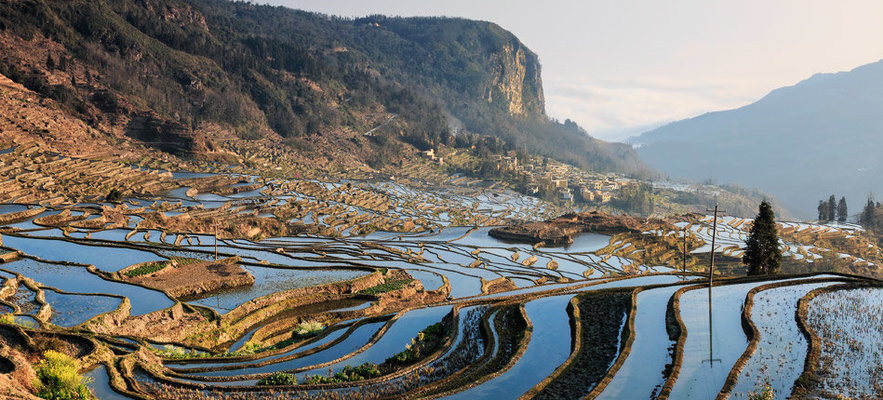Yuanyang’s Rice Terraces of the Hani ethnic minority are a World Heritage site since 22. June, 2013. It is particularly well known among photographers for its unique and spectacular scenery. Together with the blogger Fabio Nodari, we visited the area. Check out his pictures and story! The full English article can be found here.
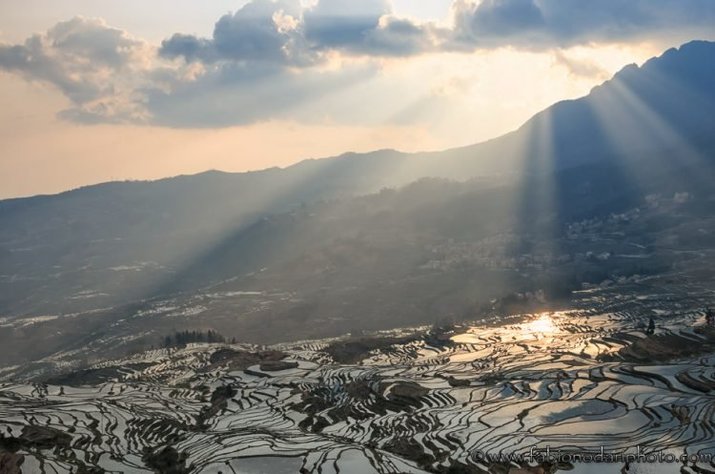
China is a truly unique country: it’s the most populous in the world but due to its policy we don’t know much about it. Many people have a lot of prejudices, due to the mass-media anti-China propaganda. Most of the time we hear news about the pollution or some kind of conflicts in the South China sea. China is much ore though: there is a great variety of minorities and there are some of the most amazing landscapes in the world. Of all the truly unique places found in China there was one in particular that I always wanted to see: YuanYang (元阳) in Yunnan, famous for the huge rice terraces built on the cliffs of mountains above 2000 meters. There are many countries with rice terraces but none of them are as nearly as amazing as YuanYang. In the past I visited Sapa, in Vietnam, famous for the rice terraces but honestly it was a big delusion. For this reason, before visiting YuanYang I didn’t know what to expect. There are some places in the world, so famous that when you finally visit them, it seems like you’ve been there already and most of the times they are not as you expected. At least this is what happens to me a lot of times. So what about YuanYang? Is it worth getting to this remote place in China close to the border with Laos and Vietnam? Absolutely yes!
YuanYang (元阳): a bit of history
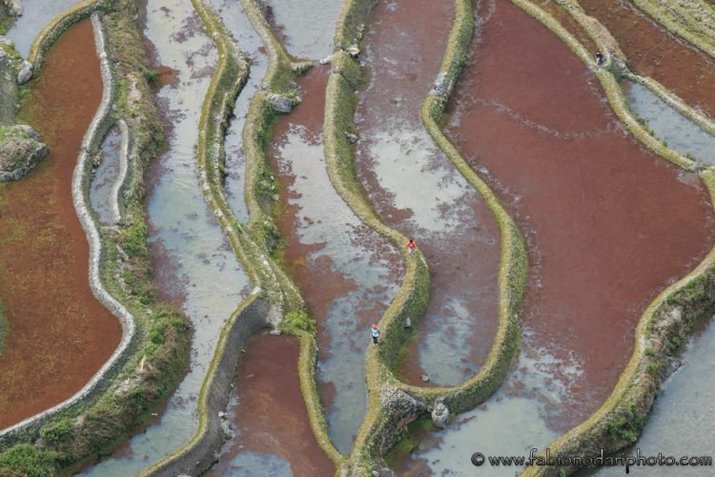
YuanYang is located in the HongHe (红河) prefecture. The lowest altitude is 144 meters and the highest peak reaches almost 3000 meters so, as you can imagine, the climate varies a lot, depending where you are. 34% of the population belongs to the Han group (what we generally call Chinese people) and the other 66% is made up of people belonging to different minorities. The HaNi (哈尼) people are those who built, it took centuries, the beautiful rice terraces. Even though we often associate the word minority to people who are somehow less advanced than the rest of the population, the HaNi people did an incredible job. The first question I asked myself was: how did those people managed to fill the rice terraces with water since they are built on steep mountains? The answers is as simple as incredible: they took advantage of the unique climate of this region! Basically on winter there is a big difference of temperature between the valleys (with a tropical climate) and the mountains (with a much colder weather) and this causes a lof of evaporation. The water, in form of fog and cloud, evaporates and filters through the forest in the mountains. All this mist forms streams of water that flow into the rice terraces and go down to the valley again. Simple but very efficient! They also used the source of the Red River to water the fields. This process never ends and it’s ecofriendly!
What to see in YuanYang
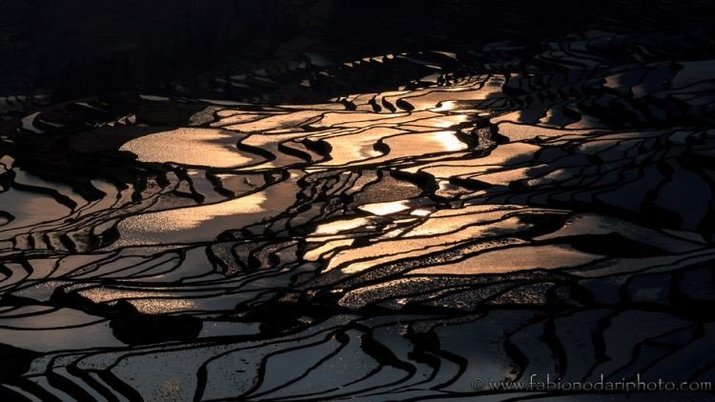
Even though there are rice terraces pretty much everywhere in YuanYang, there are only three observation points that are part of the UNESCO World Heritage. On these three points, observation platforms have been built to accommodate hundreds of tourists and photographers. To get to these platforms you’ll have to pay a fee of 100rmb but I think are money well spent. In my experience, every time I see a lot of tourists, I try to avoid the crowd and find some off-the-beaten-path spots. Often those spot are empty and have a better view, but YuanYang it’s an exception. The official platforms have the best view you’ll find in YuanYang, and even though you can still find great “unofficial” observation spots, you can’t miss the three platforms. This is how they are called: Bada (坝达), Duoyishu (多依树) e Laohuzui (老虎嘴).
Duoyishu (多依树)
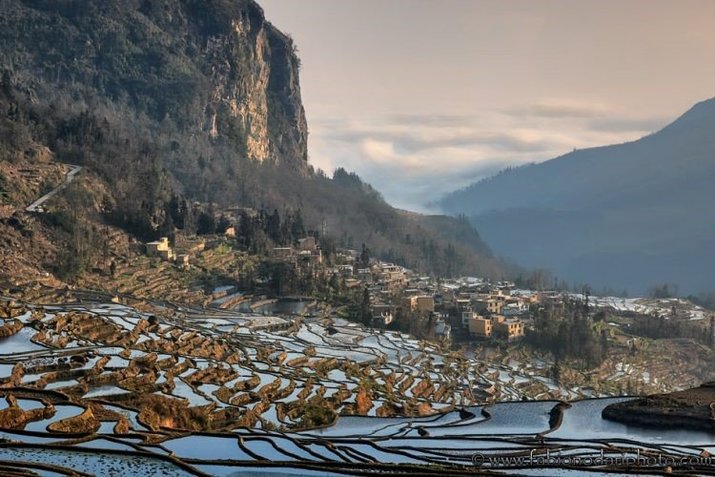
Duoyishu is the best place to see the sunrise and for this reason is a good idea to find your accommodation nearby. In this way you can just walk to the platform early in the morning without looking for some kind of transportation (there are no public buses). It will be difficult to find someone who can drive you to Duoyishu before sunrise, unless you hire a private driver.

Duoyishu is famous for the sea of clouds that early in the morning covers part of the terraces: truly a beautiful sight. The name of this place comes for the village nearby and the HaNi people call this place “the paradise on earth”
Laohuzui (老虎嘴)
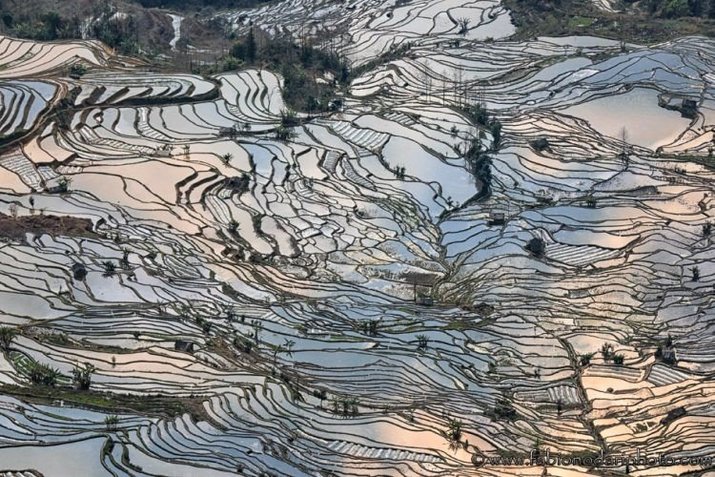
Laohuzui got its name from its tiger mouth liked shape which is formed by its big altitude gap and steep terrain. It’s altitude is 1400 meters, which is 800 meters higher than the valley region and it has 27 squared Km terraces fields. It’s one of the two ideal spots to see the sunset.
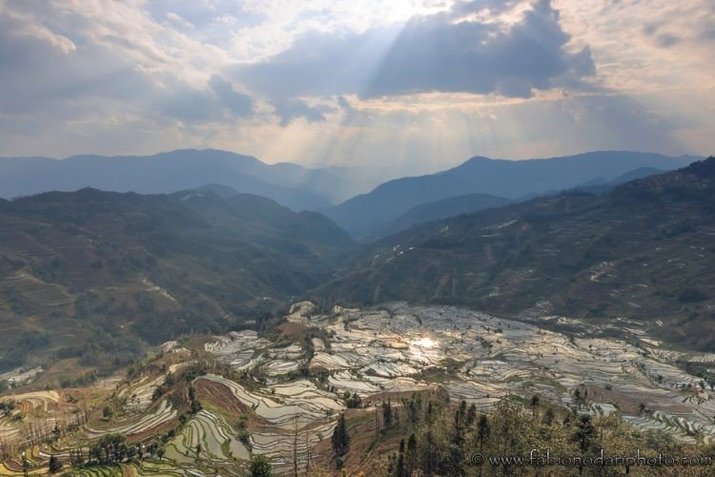
Laohuzui is the steepest, most spectacular and magnificent terraced landscape. For this reason it’s a good idea to come well before sunset: there are a lot of people in China and they seem to like Laohuzui too!
Bada (坝达)
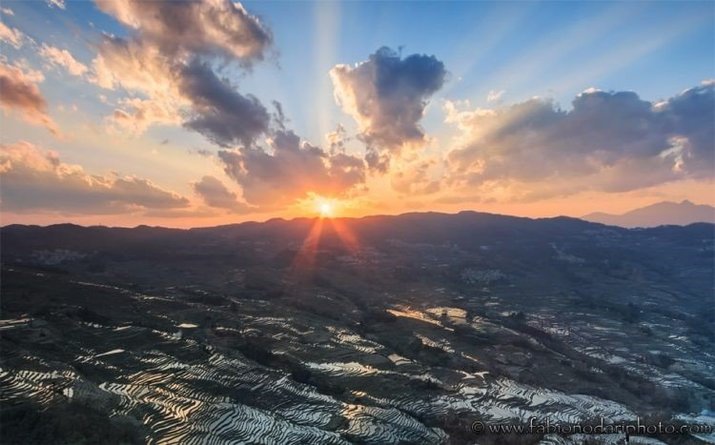
Bada is a direct translation from the HaNi language and it means that “HaNi is the nearest place to the sky”. Bada is the other ideal place to see the sunset and it’s really huge: it covers a surface of 56 squared Km. Keep in mind that all the rice terraces were build by hand and it took centuries to make them so 56 squared Km are a lot! When you’ll finally get to this place you will be stunned. Those humble farmers did something incredible just because they needed food without realizing that they created a masterpiece of art. The terraces start at an altitude of 800 meters and extends to more than 2000 meters. With terraced ridge as the unit, there are more than 3700 steps of terrace. It truly looks like a “stairway to heaven”.
Laoyingzui (老鹰嘴)

Laoyingzui (not to be confused with Laohuzui, one of the three official platforms) is one of the “unofficial” view points. Laoyingzui is at the top of a cliff and with an inclination of 90° you’ll see the rice terraces from above just like an eagle does (that’s where the name comes from) . The place can be a bit dangerous since there are no protections and the wind can be really strong. Laoyingzui It’s on the way to Bada but strangely it’s not mentioned on the maps nor on the street signs so it’s very easy to miss it. The only way to find it is to ask around or to show the Chinese name to some local people and they will surely know where it is.
Shengcun Market (胜村市集)
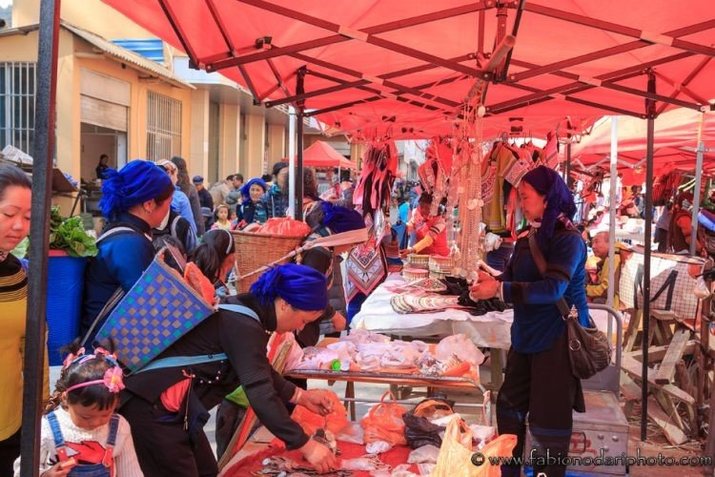
Besides the rice terraces, YuanYang is the ideal palce to see how the HaNi e Yi minorities live. By exploring the countryside you’ll see how most of the Chinese people live their lives. Just 4 or 5 Km from Duoyishu you can visit the Shengcun market and it’s really worth spending some time there especially if you have never visited an ethnic market. Just a word of advise: before heading Shengcun ask your hotel if that day there is the market, because not every day is open.
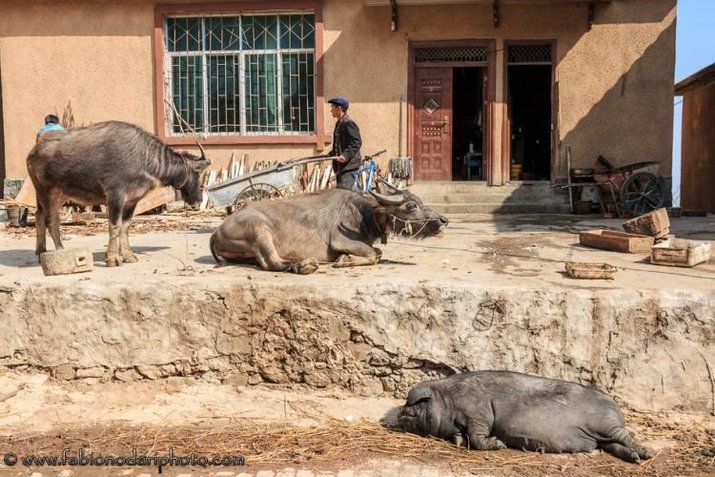
During the day take some time to walk around the and take some interesting pictures.
Yuanyang rice terraces best time to visit, how to get there and how to get around

YuanYang rice terraces give their best when they are filled with water. Due to the altitude, even though YuanYang is on the Tropics, the rice it’s harvested only once a year and this means that the fields are filled with water only from November until the beginning of March. If you are planning a trip on that season be sure to avoid the Spring Festival (usually between the end of January and the beginning of Febraury). Getting to YuanYang it’s not easy since there are no airports nor railways nearby. The best solution is to take a long distance bus from Kunming South Coach Station. There are 3 buses per day: one at 9:30, one at 12:30 and a night bus at 18:00 but the timetable can change at anytime so it’s a good idea to ask your hotel to check the exact time. Another good idea is to book the bus one day in advance to secure your seat. This is true both when you go to YuanYang and when you come back. Keep in mind that the bus doesn’t get to YuanYang but it stops in the town of XinJie about one hour before your destination. From XinJie you can take a minivan to your final destination. The price should be around 20RMB per person. The other solution would be to hire a driver with a car but it will obviously be more expensive.
Once in YuanYang remember that the three observation platforms are quite far from one another and the best way to get around, since there are not public buses, would be to stop one of the many vans and ask for a lift. It should be pretty cheap. The only problem would be communicating with the driver especially if you can’t speak mandarin. But even if you can many people speak only their dialects so communicating it’s really challenging. In my experience the best thing to do is to write on a peace of paper the name of your destination written in Chinese characters. Travelling in China is not easy and doing it in remote places it’s even more difficult but you will be rewarded with some of the most beautiful landscapes on earth.
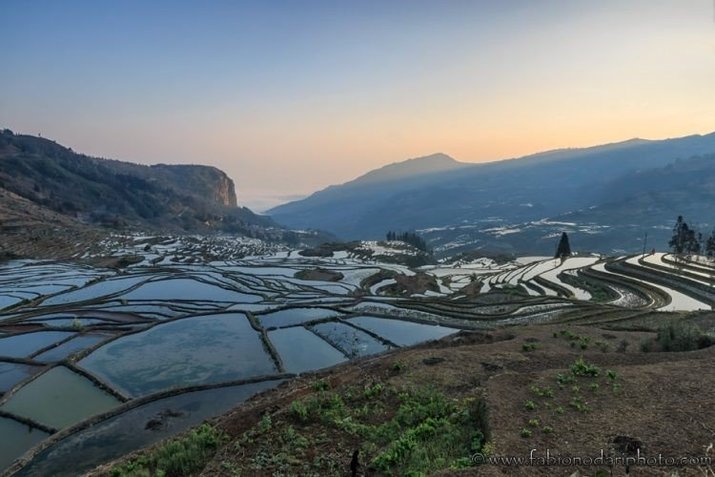
For further travel information or tour recommendations, please get in touch with us directly, happy to support you!
- 337 reads
- Like this






